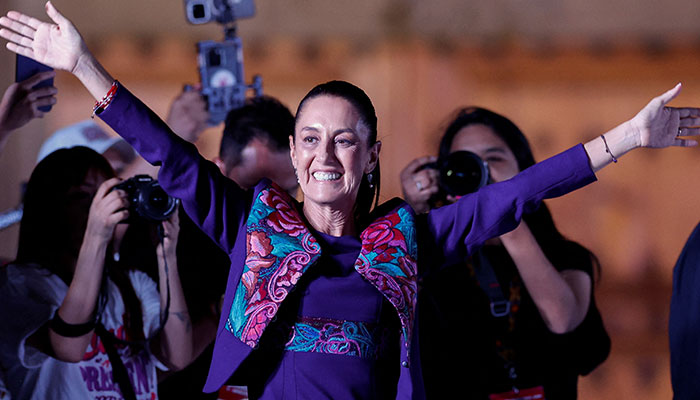Mexico's Sheinbaum wins landslide to become country's first woman president
Sheinbaum wins around 60% vote as opposition candidate concedes defeat
June 03, 2024

- Sheinbaum wins around 60% vote, opposition candidate secures 28%.
- She is a mentee of outgoing president Andres Manuel Lopez Obrador.
- Newly-elected president faces issues on domestic, int'l front.
MEXICO CITY: Claudia Sheinbaum, a climate scientist and former mayor of Mexico City, has made history to become Mexico's first-ever woman president after securing a landslide victory in the country's presidential polls.
Building on her mentor and outgoing president Andres Manuel Lopez Obrador's popularity among the poor sections of society, Sheinbaum managed to secure 58.3% to 60.7% of the vote as reflected in a rapid sample count by the country's electoral authority — the highest vote percentage in Mexico's democratic history.
Opposition candidate Xochitl Galvez has conceded defeat after preliminary results showed her taking between 26.6% and 28.6% of the vote.
Furthermore, the ruling coalition was also on track for a possible two-thirds super majority in both houses of Congress allowing them to pass constitutional reforms without opposition support, according to the range of results given by the electoral authority.
"For the first time in the 200 years of the republic I will become the first woman president of Mexico," Sheinbaum told supporters to loud cheers of "president, president".
Her victory is a major step for Mexico, a country known for being the world's second-biggest Roman Catholic population, which for years pushed more traditional values and roles for women.
Sheinbaum is the first woman to win a general election in the United States, Mexico or Canada.
"I never imagined that one day I would vote for a woman," said 87-year-old Edelmira Montiel, a Sheinbaum supporter in Mexico's smallest state Tlaxcala.
"Before we couldn't even vote, and when you could, it was to vote for the person your husband told you to vote for. Thank God that has changed and I get to live it," Montiel added.
However, the country's first woman president has a complicated path ahead as she must balance promises to increase popular welfare policies while inheriting a hefty budget deficit and low economic growth.
After preliminary results were announced, she told supporters her government would be fiscally responsible and respect the autonomy of the central bank.
She has vowed to improve security but has given few details and the election, the most violent in Mexico's modern history with 38 candidates murdered, has reinforced massive security problems. Many analysts say organized crime groups expanded and deepened their influence during Obrador's term.
Sunday's vote was also marred by the killing of two people at polling stations in Puebla state. More people have been killed — over 185,000 — during the mandate of Obrador than during any other administration in Mexico's modern history, although the homicide rate has been inching down.
"Unless she commits to making a game-changing level of investment in improving policing and reducing impunity, Sheinbaum will likely struggle to achieve a significant improvement in overall levels of security," said Nathaniel Parish Flannery, an independent Latin America political risk analyst.
The ruling MORENA party also won the Mexico City mayorship race, one of the country's most important posts, according to preliminary results.
What lies ahead
Other than handling relations with neighbouring United States over border issues pertaining to migrants and drug trafficking, the president will be facing several domestic issues such as electricity and water shortages and luring manufacturers to relocate as part of the nearshoring trend, in which companies move supply chains closer to their main markets.
Sheinbaum will also have to wrestle with what to do with Pemex, the state oil giant that has seen production decline for two decades and is drowning in debt.
"It cannot just be that there is an endless pit where you put public money in and the company is never profitable," said Alberto Ramos, chief Latin America economist at Goldman Sachs. "They have to rethink the business model of Pemex."
Obrador doubled the minimum wage, reduced poverty and oversaw a strengthening peso and low levels of unemployment — successes that made him incredibly popular.
Sheinbaum has promised to expand welfare programs, but it will not be easy with Mexico on track for a large deficit this year and sluggish GDP growth of just 1.5% expected by the central bank in 2025.
Obrador has loomed over the campaign, seeking to turn the vote into a referendum on his political agenda. Sheinbaum has rejected opposition claims that she would be a "puppet" of Obrador, though she has pledged to continue many of his policies including those that have helped Mexico's poorest.
In her victory speech, Sheinbaum thanked Obrador as "a unique person who has transformed our country for the better".
But political analyst Viri Rios said she thought sexism was behind criticism that Sheinbaum was going to be a puppet of the outgoing leader.
"It's unbelievable that people cannot believe she's going to be making her own decisions, and I think that's got a lot to do with the fact that she's female," she said.











